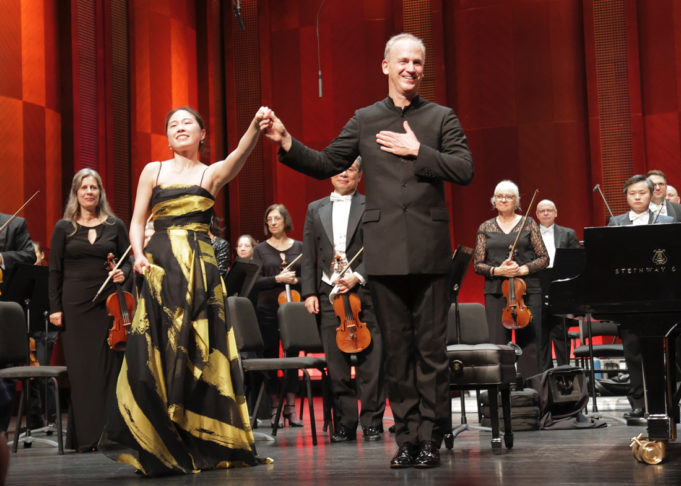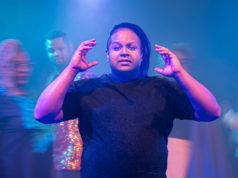The semifinal round of the Van Cliburn Competition had its 12 remaining pianists playing Mozart concertos with the Fort Worth Symphony Orchestra. The star of this stage was Conductor Carlos Miguel Prieto, who is new to the Cliburn. The Mexican maestro’s career has taken him all over America (with stints in Houston, Charlotte, New Orleans, and Washington), and while he isn’t a Mozart specialist, he could have fooled me with his seamless accompaniment of the very different semifinalists.
Among those, the best were Aristo Sham (Hong Kong), who was impeccable in the 23rd Concerto, and Elia Cecino (Italy), stellar in the 24th. Vitaly Starikov (Israel/Russia) lost some of the pathos in the second movement of the 20th Concerto, but the outer movements were quite good in his hands. After a slow start, Park Chae-young (South Korea) caught fire in the faster passages of the 20th.
In addition to the concertos, the semifinalists had to play a one-hour recital, and Jonas Aumiller (Germany) was, to no one’s surprise, completely at home in Brahms’ Op. 118 intermezzi, teasing out the German master’s phrases with a graceful sense of proportion. He also played his own transcription of Liszt’s Les Préludes, which was similar enough to Liszt’s B minor Sonata that I figured maybe it was his way of showing that he could play that sonata without actually having to play it and find new stuff in that chestnut. I was impressed, but the judges evidently weren’t sufficiently so, because they left him out of the finals.
The same fate was suffered by Cecino, who played Sofia Gubaidulina’s Toccata-Troncata in tribute to the grand Soviet dissident composer who died less than three months ago. That modernist piece served as a tasty appetizer to his appropriately grinding rendition of Prokofiev’s Seventh Piano Sonata. The native of Treviso was terrific with Russian piano music, although his reading of Schumann’s First Piano Sonata did fall apart. Is that why he didn’t make the finals?
I’m also casting about for reasons why Cai Yangrui (China) didn’t get there. His version of Mozart’s 25th Concerto did fade after a bright start, but his recital program showed off his talent for phantasmagoria, with a spooky interpretation of Thomas Adès’ Darknesse Visible giving way to a glorious-sounding Gaspard de la Nuit. His take on Prokofiev’s 10 Pieces from Romeo and Juliet was also on point. Like Aumiller and Cecino, he is young enough that he may compete here again in 2029.
The other eliminated semifinalists also enjoyed fits of brilliance, with Chen Yanjun (China) dazzling at times with Ravel’s Jeux d’eau and Schumann’s Kreisleriana, while Park Chae-young (South Korea) showed off her feel for Scriabin in his Fantasy, and her performance of Beethoven’s “Hammerklavier” Sonata had great moments alongside its structural failures. As for former PianoTexas guest artist Piotr Alexewicz (Poland), I liked his boldly colored playing on Schumann’s Fantasie, and he made a case for Ottorino Respighi’s seldom-heard Six Pieces for Piano.
A couple of my favorites reached the finals. While his Scriabin’s Tenth Piano Sonata meandered a bit, Sham hasn’t disappointed me yet, and he turned in a focused set of Rachmaninov’s Op. 39 Études-tableaux. Carter Johnson gave a different character to each piece in Schumann’s Davidsbündlertänze, found Scriabin’s mystical wavelength in his Op. 74 preludes, and made Hindemith’s Third Piano Sonata into an intriguing little machine.
(By the way, I neglected to say last week that Johnson, a native of Vancouver Island, is representing Canada as well as USA. My apologies to him and his Canadian followers. I don’t want Donald Trump to annex Canada. I’m also rooting for the Edmonton Oilers in the Stanley Cup finals.)
I didn’t care much for Philipp Lynov (Russia) in the opening round, but he has picked up momentum since then, with a terrific account of Taneyev’s Prelude and Fugue in G-sharp minor and a Prokofiev Eighth Piano Sonata that was right in his wheelhouse. I’m less high on Starikov. His performance of Prokofiev’s Seventh Sonata was on the border between interestingly slow and overly ponderous, and his Chopin Op. 25 Études were messy and overpedaled. I am looking forward to hearing his Bartók concerto in the final round, though.
Most of the performances by Evren Ozel (USA) have struck me as 7 out of 10, solid without taking too many chances. Maybe that’s what gets you through a competition like this, but I prefer pianists who are willing to risk failure. Anyway, the Minneapolis native did sparkle in Liszt’s “Les jeux d’eaux à la Villa d’Este” and show some thorns in Bartók’s Out of Doors. As for Angel Stanislav Wang (USA), I don’t hear what his followers in the hall are hearing. His phrasing was stilted and lacking fluency in Beethoven’s “Appassionata” Sonata, though he did come strong in the final movement of that piece. The different parts of Mussorgsky’s Pictures at an Exhibition weren’t differentiated enough from one another, and even “The Great Gate of Kiev” was underwhelming.
So, no Chinese pianists made it to the final round, which is surprising given how many started the competition. Also no women, and while you can debate the individual merits of the eliminated female contestants, having an all-male final does make it less interesting. My enthusiasm will nevertheless be turned up as I cover the big concertos that will wind up this competition and crown another winner.












